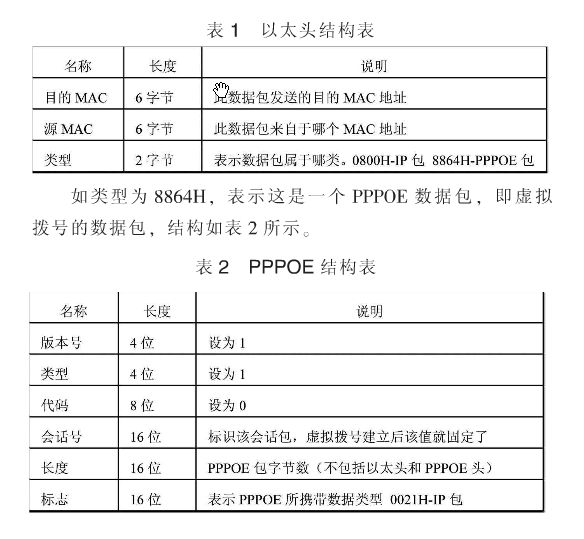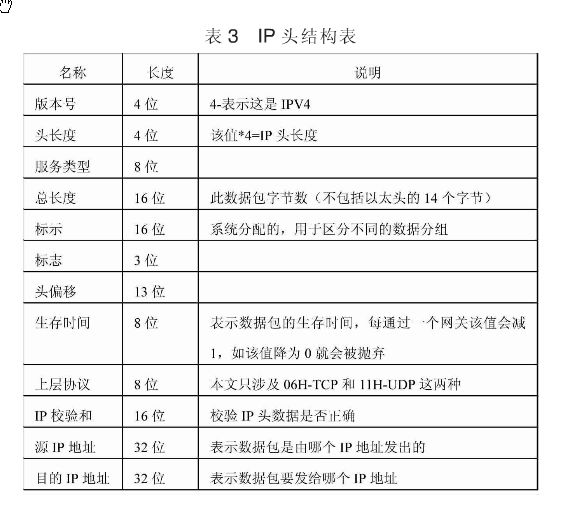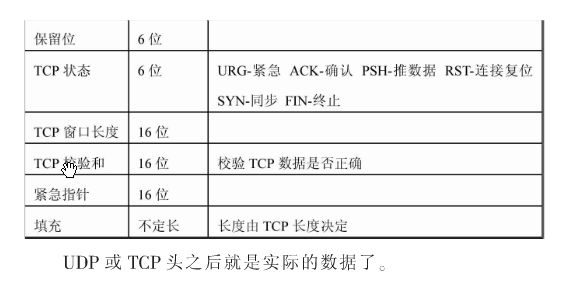winpcap捕获数据包
//技术手册:http://www.ferrisxu.com/WinPcap/html/index.html
| |
Winpcap配置编程环境:
安装Winpcap,接着:
1> 从WWW.WINPCAP.ORG 上下载WINPCAP SDK -WpdPack,WinPcap SDk 里面包含库
文件,头文件,文档文件和一些例子。解压到一个指定的目录。解压缩后把Include 目录添
加到IDE 的包含文件中(VC6.0 Tools->Option->Directory; VS 2003/2005/2008 工具->选项->项目
和解决方案/ 项目->VC++ 目录); lib 目录添加为新的库文件目录( VC6.0
Tools->Option->Directory; VS 2003/2005/2008 工具->选项->项目和解决方案/项目->VC++目录);
添加wpcap.lib和ws2_32.lib(工程属性->链接器->输入->附加依赖项)
2> 如果一个源文件使用了WinPcap 提供的库函数,那么就需要在该文件开始的位置添加
pcap.h 包含文件(或者在引用的文件中),即#include “pcap.h”
也许会出现下面的错误:
fatal error C1083: 无法打开包括文件:“pcap.h”: No such file or directory
这个错误表明找不到pcap.h 文件,这个头文件在驱动程序安装完成后也是没有的,它是开
发包里面的一个头文件,所以,如果要运行程序还需要到官方网站上去下载WinPcap SDK,
并按步骤1 添加到项目中。
3> 在程序中添加wpcap.lib。如果出现下面错误
error LNK2019: 无法解析的外部符号_pcap_findalldevs_ex,该符号在函数XXX 中被引用,
如果发生上面的错误就表明缺少库文件, 需要添加wpcap.lib 到工程中(VC6.0
Project->Settings->Link->Object/library modules; VS 2003/2005/2008 项目->添加现有项->所有文件)
4> 新的版本里WinPcap 支持远程数据包获取,所以还应当添加预处理定义WPCAP和HAVE_REMOTE
添加时注意必须以如下图的格式为好:
否则会发生下面的错误
error C2065: “PCAP_SRC_IF_STRING”: 未声明的标识符
error C3861: “pcap_findalldevs_ex”: 找不到标识符
error C2065: “PCAP_OPENFLAG_PROMISCUOUS”: 未声明的标识符
error C3861: “pcap_open”: 找不到标识符
5> 如果还有问题,可以到WinPcaP 官方网站上找FAQ。
snaplen:需要保留的数据包的长度。对每一个过滤器接收到的数据包,第一个‘snaplen’字节的内容将被保存到缓冲区,并且传递给用户程 序。例如,snaplen等于100,那么仅仅每一个数据包的第一个100字节的内容被保存。简言之就是从每一个包的开头到snaplen的那段内容将被 保存。
flags:保存一些由于抓包需要的标志。Winpcap定义了三种标志:
l PCAP_OPENFLAG_PROMISCUOUS:1,它定义了适配器(网卡)是否进入混杂模式(promiscuous mode)。
l PCAP_OPENFLAG_DATATX_UDP:2,它定义了数据传输(假如是远程抓包)是否用UDP协议来处理。
l PCAP_OPENFLAG_NOCAPTURE_RPCAP:4,它定义了远程探测器是否捕获它自己产生的数据包。
read_timeout:以毫秒为单位。read timeout被用来设置在遇到一个数据包的时候读操作不必立即返回,而是等待一段时间,让更 多的数据包到来后从OS内核一次读多个数据包。并非所有的平台都支持read timeout;在不支持read timeout的平台上它将被忽略。
auth:一个指向’struct pcap_rmtauth’的指针,保存当一个用户登录到某个远程机器上时的必要信息。假如不是远程抓包,该指针被设置为NULL。
errbuf:一个指向用户申请的缓冲区的指针,存放当该函数出错时的错误信息。
返回值是一个’pcap_t’指针(就是我们一般所说的网卡的指针),它可以作为下一步调用(例如pcap_compile()等)的参数,并且指定了一个已经打开的Winpcap会话。在遇到问题的情况下,它返回NULL并且’errbuf’变量保存了错误信息。
如何获取数据包的内容呢?
我们首先来看看包的结构:
源代码:
#include "stdafx.h"
#include<iostream>
using namespace std;
#include <pcap.h>
using namespace std;
#include <stdlib.h>
#include <stdio.h>
#include <string.h>
#include <net.h>
#pragma comment(lib,"ws2_32.lib")
#define MAX_PRINT 80
#define MAX_LINE 16
#pragma once
typedef unsigned char u_int8_t;
typedef unsigned short int u_int16_t;
typedef unsigned int u_int32_t;
#define ETH_ALEN 6
struct iphdr
{
#if __BYTE_ORDER == __LITTLE_ENDIAN
unsigned int ihl:4;
unsigned int version:4;
#elif __BYTE_ORDER == __BIG_ENDIAN
unsigned int version:4;
unsigned int ihl:4;
#else
# error "Please fix <bits/endian.h>"
#endif
u_int8_t tos;
u_int16_t tot_len;
u_int16_t id;
u_int16_t frag_off;
u_int8_t ttl;
u_int8_t protocol;
u_int16_t check;
u_int32_t saddr;
u_int32_t daddr;
/*The options start here. */
};
# ifdef __FAVOR_BSD
typedef u_int32_t tcp_seq;
/*
* TCP header.
* Per RFC 793, September, 1981.
*/
struct tcphdr
{
u_int16_t th_sport; /* source port */
u_int16_t th_dport; /* destination port */
tcp_seq th_seq; /* sequence number */
tcp_seq th_ack; /* acknowledgement number */
# if __BYTE_ORDER == __LITTLE_ENDIAN
u_int8_t th_x2:4; /* (unused) */
u_int8_t th_off:4; /* data offset */
# endif
# if __BYTE_ORDER == __BIG_ENDIAN
u_int8_t th_off:4; /* data offset */
u_int8_t th_x2:4; /* (unused) */
# endif
u_int8_t th_flags;
# define TH_FIN 0x01
# define TH_SYN 0x02
# define TH_RST 0x04
# define TH_PUSH 0x08
# define TH_ACK 0x10
# define TH_URG 0x20
u_int16_t th_win; /* window */
u_int16_t th_sum; /* checksum */
u_int16_t th_urp; /* urgent pointer */
};
# else /* !__FAVOR_BSD */
struct tcphdr
{
u_int16_t source;
u_int16_t dest;
u_int32_t seq;
u_int32_t ack_seq;
# if __BYTE_ORDER == __LITTLE_ENDIAN
u_int16_t res1:4;
u_int16_t doff:4;
u_int16_t fin:1;
u_int16_t syn:1;
u_int16_t rst:1;
u_int16_t psh:1;
u_int16_t ack:1;
u_int16_t urg:1;
u_int16_t res2:2;
# elif __BYTE_ORDER == __BIG_ENDIAN
u_int16_t doff:4;
u_int16_t res1:4;
u_int16_t res2:2;
u_int16_t urg:1;
u_int16_t ack:1;
u_int16_t psh:1;
u_int16_t rst:1;
u_int16_t syn:1;
u_int16_t fin:1;
# else
# error "Adjust your <bits/endian.h> defines"
# endif
u_int16_t window;
u_int16_t check;
u_int16_t urg_ptr;
};
#endif
#define ETH_P_802_3 0x0001 /* Dummy type for 802.3 frames */
#define ETH_P_AX25 0x0002 /* Dummy protocol id for AX.25 */
#define ETH_P_ALL 0x0003 /* Every packet (be careful!!!) */
#define ETH_P_802_2 0x0004 /* 802.2 frames */
#define ETH_P_SNAP 0x0005 /* Internal only */
#define ETH_P_DDCMP 0x0006 /* DEC DDCMP: Internal only */
#define ETH_P_WAN_PPP 0x0007 /* Dummy type for WAN PPP frames*/
#define ETH_P_PPP_MP 0x0008 /* Dummy type for PPP MP frames */
#define ETH_P_LOCALTALK 0x0009 /* Localtalk pseudo type */
#define ETH_P_CAN 0x000C /* Controller Area Network */
#define ETH_P_PPPTALK 0x0010 /* Dummy type for Atalk over PPP*/
#define ETH_P_TR_802_2 0x0011 /* 802.2 frames */
#define ETH_P_MOBITEX 0x0015 /* Mobitex ( [email protected] ) */
#define ETH_P_CONTROL 0x0016 /* Card specific control frames */
#define ETH_P_IRDA 0x0017 /* Linux-IrDA */
#define ETH_P_ECONET 0x0018 /* Acorn Econet */
#define ETH_P_HDLC 0x0019 /* HDLC frames */
#define ETH_P_ARCNET 0x001A /* 1A for ArcNet :-) */
struct ethhdr {
unsigned char h_dest[ETH_ALEN]; /* destination eth addr */
unsigned char h_source[ETH_ALEN]; /* source ether addr */
u_int16_t h_proto; /* packet type ID field */
} ;
/* 4字节的IP地址 */
typedef struct ip_address{
u_char byte1;
u_char byte2;
u_char byte3;
u_char byte4;
}ip_address;
/* IPv4 首部 */
typedef struct ip_header{
u_char ver_ihl; // 版本 (4 bits) + 首部长度 (4 bits)
u_char tos; // 服务类型(Type of service)
u_short tlen; // 总长(Total length)
u_short identification; // 标识(Identification)
u_short flags_fo; // 标志位(Flags) (3 bits) + 段偏移量(Fragment offset) (13 bits)
u_char ttl; // 存活时间(Time to live)
u_char proto; // 协议(Protocol)
u_short crc; // 首部校验和(Header checksum)
ip_address saddr; // 源地址(Source address)
ip_address daddr; // 目的地址(Destination address)
u_int op_pad; // 选项与填充(Option + Padding)
}ip_header;
/* UDP 首部*/
typedef struct udp_header{
u_short sport; // 源端口(Source port)
u_short dport; // 目的端口(Destination port)
u_short len; // UDP数据包长度(Datagram length)
u_short crc; // 校验和(Checksum)
}udp_header;
/* packet handler 函数原型 */
void packet_handler(u_char *param, const struct pcap_pkthdr *header, const u_char *pkt_data);
int main()
{
pcap_if_t *alldevs;
pcap_if_t *d;
int inum;
int i=0;
pcap_t *adhandle;
char errbuf[PCAP_ERRBUF_SIZE];
u_int netmask;
char packet_filter[] = "dst host 192.168.0.1";//过了条件port 20 and ip and tcp dst host 127.0.0.1
struct bpf_program fcode;
/* 获取本机设备列表 */
if (pcap_findalldevs_ex(PCAP_SRC_IF_STRING, NULL, &alldevs, errbuf) == -1)
{
fprintf(stderr,"Error in pcap_findalldevs: %s\n", errbuf);
exit(1);
}
/* 打印列表 */
for(d=alldevs; d; d=d->next)
{
printf("%d. %s", ++i, d->name);
if (d->description)
printf(" (%s)\n", d->description);
else
printf(" (No description available)\n");
}
if(i==0)
{
printf("\nNo interfaces found! Make sure WinPcap is installed.\n");
return -1;
}
printf("Enter the interface number (1-%d):",i);
scanf("%d", &inum);
if(inum < 1 || inum > i)
{
printf("\nInterface number out of range.\n");
/* 释放设备列表 */
pcap_freealldevs(alldevs);
return -1;
}
/* 跳转到选中的适配器 */
for(d=alldevs, i=0; i< inum-1 ;d=d->next, i++);
/* 打开设备 */
if ( (adhandle= pcap_open(d->name, // 设备名
65536, // 65535保证能捕获到不同数据链路层上的每个数据包的全部内容
PCAP_OPENFLAG_NOCAPTURE_RPCAP,//PCAP_OPENFLAG_PROMISCUOUS, // 混杂模式
1000, // 读取超时时间
NULL, // 远程机器验证
errbuf // 错误缓冲池
) ) == NULL)
{
fprintf(stderr,"\nUnable to open the adapter. %s is not supported by WinPcap\n", d->name);
/* 释放设备列表 */
pcap_freealldevs(alldevs);
return -1;
}
/* 检查数据链路层,为了简单,我们只考虑以太网 */
if(pcap_datalink(adhandle) != DLT_EN10MB)
{
fprintf(stderr,"\nThis program works only on Ethernet networks.\n");
/* 释放设备列表 */
pcap_freealldevs(alldevs);
return -1;
}
if(d->addresses != NULL)
/* 获得接口第一个地址的掩码 */
netmask=((struct sockaddr_in *)(d->addresses->netmask))->sin_addr.S_un.S_addr;
else
/* 如果接口没有地址,那么我们假设一个C类的掩码 */
netmask=0xffffff;
//编译过滤器
if (pcap_compile(adhandle, &fcode, packet_filter, 1, netmask) <0 )
{
fprintf(stderr,"\nUnable to compile the packet filter. Check the syntax.\n");
/* 释放设备列表 */
pcap_freealldevs(alldevs);
return -1;
}
//设置过滤器
if (pcap_setfilter(adhandle, &fcode)<0)
{
fprintf(stderr,"\nError setting the filter.\n");
/* 释放设备列表 */
pcap_freealldevs(alldevs);
return -1;
}
printf("\nlistening on %s...\n", d->description);
/* 释放设备列表 */
pcap_freealldevs(alldevs);
/* 开始捕获 */
pcap_loop(adhandle, 0, packet_handler, NULL);
return 0;
}
/* 每次捕获到数据包时,libpcap都会自动调用这个回调函数 */
void packet_handler(u_char *param, const struct pcap_pkthdr *header, const u_char *pkt_data)
{
/*struct tm *ltime;
char timestr[16];
time_t local_tv_sec;
// 将时间戳转换成可识别的格式
local_tv_sec = header->ts.tv_sec;
ltime=localtime(&local_tv_sec);
strftime( timestr, sizeof timestr, "%H:%M:%S", ltime);
printf("%s,%.6d len:%d\n", timestr, header->ts.tv_usec, header->len);*/
struct tm *ltime;
struct iphdr *ip;
struct ethhdr *eth;
struct tcphdr *tcp;
char timestr[16];
ip_header *ih;
udp_header *uh;
u_int ip_len;
u_short sport,dport;
time_t local_tv_sec;
pkt_data=(pkt_data + sizeof(struct ethhdr) + sizeof(struct iphdr)+sizeof(struct tcphdr))-4;//-4 表示移动32位
const char* target="corporation/login_corporation.yizhi?method=verify";
if(!(strstr((char*)pkt_data,target)))
{
return;
}
if()
oa/corporation/login_corporation.yizhi?method=verify
cout<<pkt_data<<endl;
}



